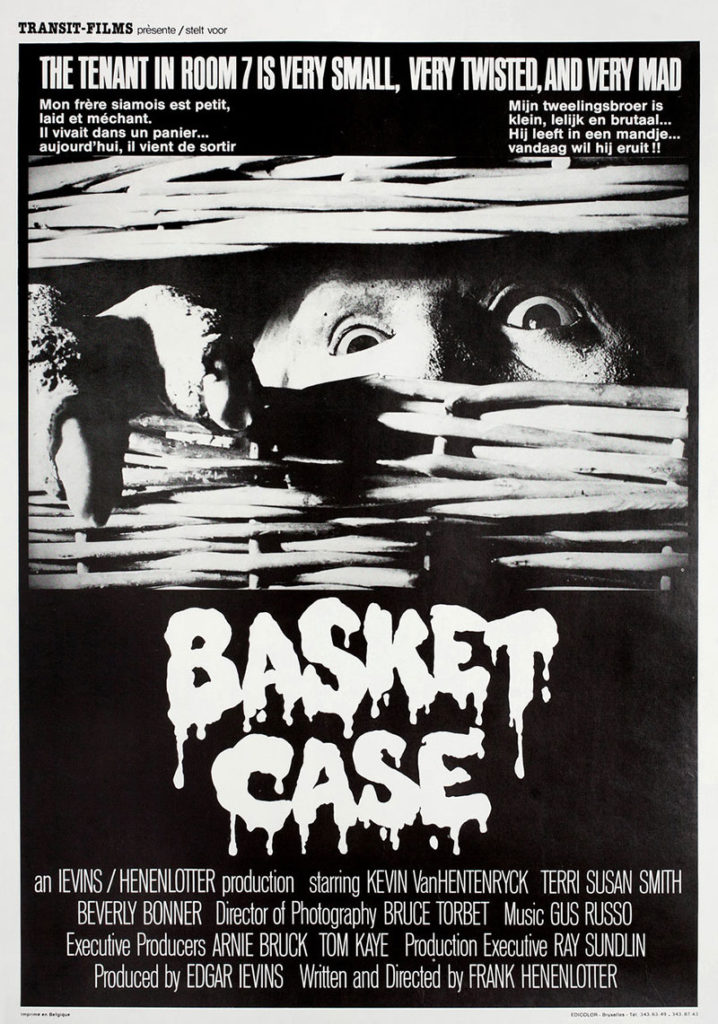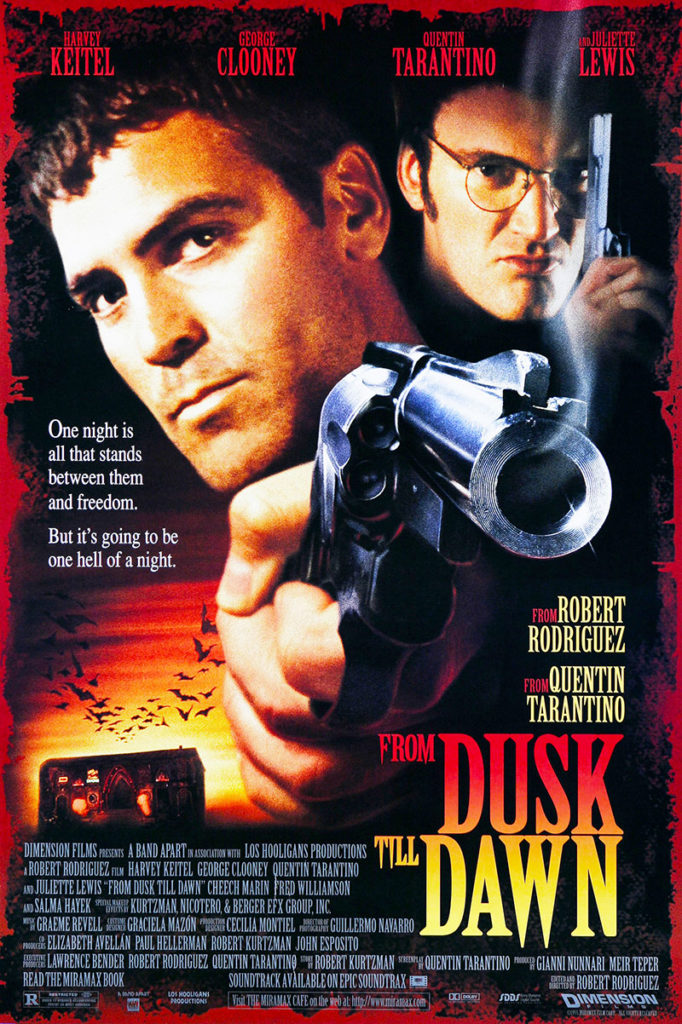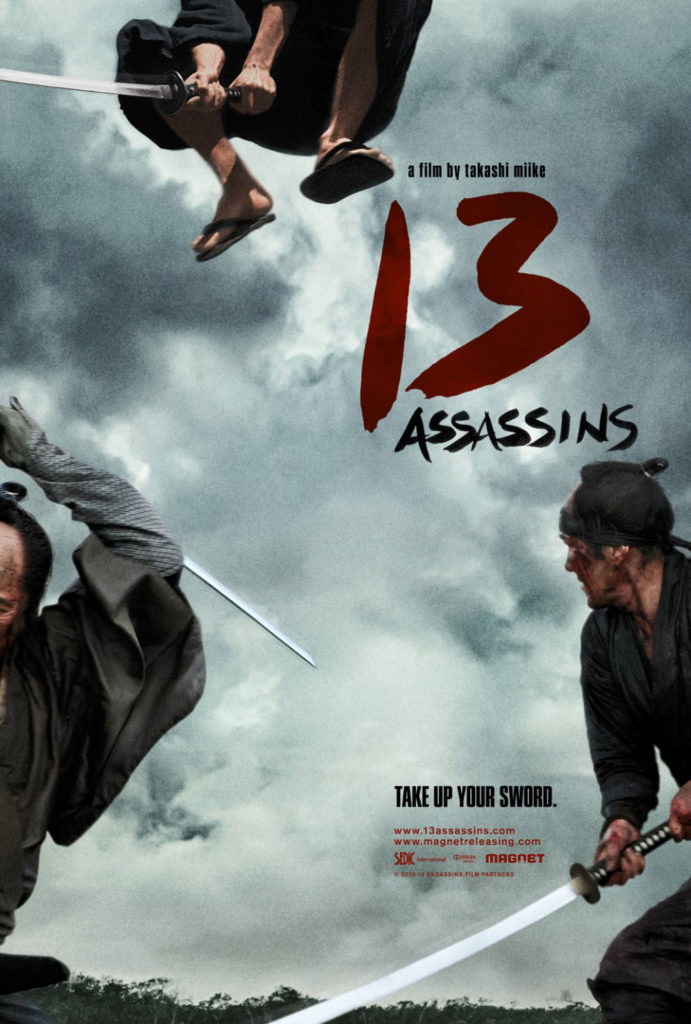Stan Winston was legendary in the film industry. Before he died, he won three Oscars for visual effects (Aliens, Terminator 2: Judgment Day, and Jurassic Park), one for makeup (Terminator 2 again), and racked up a total of six other nominations. He either led or was part of the effects and makeup teams that worked on The Thing, The Terminator, Ghoulies, Predator, Leviathan, Edward Scissorhands, Batman Returns, Interview with the Vampire, Avatar, et cetera, et cetera, et cetera. In short, the man had a hell of a career turning the unreal into the real. In horror, he was a master monster maker. But, a man has to branch out, explore new opportunities. Enter Pumpkinhead. Continue reading “Pumpkinhead”
Tag: Bloody Flick
Basket Case
 This is one of the more bizarre movies I’ve ever seen. From writer/director Frank Henenlotter, Basket Case is an ultra low budget black comedy horror flick about a young man and his brother. By all accounts, Duane Bradley is a normal person. Raised in upstate New York, he’s on his first trip to the big city. He’s naïve — green as all hell, in fact — but he has his charms, and it’s easy to tell that the city can’t come close to extinguishing all his innocence.
This is one of the more bizarre movies I’ve ever seen. From writer/director Frank Henenlotter, Basket Case is an ultra low budget black comedy horror flick about a young man and his brother. By all accounts, Duane Bradley is a normal person. Raised in upstate New York, he’s on his first trip to the big city. He’s naïve — green as all hell, in fact — but he has his charms, and it’s easy to tell that the city can’t come close to extinguishing all his innocence.
Duane finds himself a room in a seedy hotel near Times Square (Basket Case was released in 1982, a whole universe away from today’s Times Square). He carries all his worldly possessions on his person. A big wad of cash, a backpack full of clothes, and a wicker basket in which he carries his brother. Wait...what?
I’m not going to pretend it’s any surprise what’s in the basket. It could have been anything, but it’s pretty clear early on this is a creature feature, so of course there’s a monster in the basket. It’s revealed that the monster is Duane’s onetime conjoined twin, forcibly removed by a gaggle of less than ethical doctors when Duane and his brother were just boys. Left for dead, the twin, named Belial, reunites with Duane, and after the two grow into adulthood, they set in motion a plan to take revenge on the doctors who wronged them. Continue reading “Basket Case”
Zombi 2
I could not imagine there being an October Horrorshow without a zombie flick. REC got close, but that and other recent movies are from the new wave of zombie fare — i.e., the bad guys aren’t zombies, they’re infected by some nefarious viral agent. But Halloween just couldn’t be Halloween without a horde of the classic lumbering undead making an appearance on my screen. Enter director Lucio Fulci’s Zombi 2, the 1979 Italian sequel/non-sequel to George Romero’s Dawn of the Dead. Continue reading “Zombi 2”
Piranha 3D
It’s October, when calm nights are suddenly pierced by screams, unseen malevolent presences terrorize entire families, crazed masked murderers stalk virginal teenagers, and Missile Test celebrates all that is evil in the world with the October Horrorshow, a month’s worth of horror film reviews. A good horror film? We’ll watch it. A bad horror film? Bring it on. An absolutely putrid pile of dog shit that had no business being produced at all? Yep, we’ll delve into those, too. Because the only thing that matters during the October Horrorshow is that there’s blood. And today’s selection has plenty of that, and not much else worth watching. Continue reading “Piranha 3D”
From Dusk Till Dawn 2: Texas Blood Money
Listen closely at night and you should be able to hear the sound of the flapping of leathery wings. It’s October, when vampires in Chiroptera guise search for blood. And why not? October is the month of Halloween, and Missile Test is celebrating by reviewing horror films all month. It doesn’t matter if a film is good, bad, or so awful it would be better if all copies were burnt. If there’s blood, it gets a fair hearing. Today’s movie is a real dog born from a recent classic. Continue reading “From Dusk Till Dawn 2: Texas Blood Money”
[•REC]
October is upon us. Aliens are invading, wolfmen howl at the moon, vampires avoid mirrors, and the walls are bleeding. It’s the month of Halloween, which means it’s time for the October Horrorshow, a whole month of horror film reviews on Missile Test. The good, the bad, and the putrid will all be represented in these pages. It doesn’t matter, as long as there’s blood. Continue reading “[•REC]”
From Dusk Till Dawn, or, a Tale of Two Movies
 October has come again. It being the month of Halloween, we at Missile Test choose to celebrate by watching and reviewing horror films. Ah, blood. There just can’t be enough in October. Today’s selection has plenty of it, even though it’s mostly green. But what the hell, it’s all in fun.
October has come again. It being the month of Halloween, we at Missile Test choose to celebrate by watching and reviewing horror films. Ah, blood. There just can’t be enough in October. Today’s selection has plenty of it, even though it’s mostly green. But what the hell, it’s all in fun.
Quentin Tarantino was riding high after the success of Pulp Fiction, a film that had a strong case for winning Best Picture at the Oscars the year it came out. Was it Tarantino’s youth which kept his opus from taking home the top prize? Who knows? Some of the competition were no slouches in their own right, but none broke any new ground, nor did they spawn a whole genre of imitations that crop up in cinema to this day (just like Alien and all its clones). And the winner that year, Forrest Gump, felt like little more than the Baby Boomers trying to justify their actions in retrospect by infusing their youths with blandness and innocence, when naiveté (with a sharp edge, at least) would have been a more apt description. This trivializes the profound role they played in turning public opinion against the war in Vietnam, but their role was not nearly as important as that played by the news media who brought home the images of war to the American public. The youth had always been suspicious, and were never onboard with the war policy from the beginning, but every other demographic in America couldn’t have given two shits if we had been winning the war instead of losing it. Anyway, I honestly can’t tell if that film was an apology to their parents or an apology to the directionless void of malaise left behind by their sudden thrust into real adulthood that was then passed on to their slacker Gen X children. Continue reading “From Dusk Till Dawn, or, a Tale of Two Movies”
Reign of Fire
What a gloriously stupid movie. Reign of Fire, from 2002, is about a post-apocalyptic near future in which dragons have been mistakenly awakened from a cave deep underneath London, and have turned the earth into a blackened ball of ash. A group of survivors, led by Quinn (Christian Bale), are eking out a meager existence in a ruined castle in Northumberland in the north of England, keeping their heads low and trying not to starve to death. They’ve reached a kind of perilous equilibrium, sure that as the dragons have burnt the surface of the planet to a crisp, it will only be a matter of time before the beasts all starve to death as well, and then rebuilding human civilization can begin. It’s a dangerous waiting game, between this meager group and the beasts, caught in a race to see which side can outlast the other. No side can hold out much longer, both heir to a land blackened and barren. The humans have pluck, and left alone, they may be the ones to survive, while the dragons, after all, are only animals. Continue reading “Reign of Fire”
13 Assassins
 Three historical periods in Japan are among the most interesting and compelling in the annals of human civilization. The Sengoku period, also known as the Warring States period, comprised the height of feudal conflict from the 15th century to the early 17th century, culminating in the unification of Japan under the Tokugawa Shogunate in 1603. The new era of peace which followed, the Edo period, lasted until the Shogunate collapsed in the wake of internal and external pressures for Japan to end its forced isolation and open its shores to the modern world in the 1860s. What followed was the Meiji period, when the emperor was restored to power, and Japan, through numerous fits and starts, became the empire that was finally defeated by the Allies in World War II.
Three historical periods in Japan are among the most interesting and compelling in the annals of human civilization. The Sengoku period, also known as the Warring States period, comprised the height of feudal conflict from the 15th century to the early 17th century, culminating in the unification of Japan under the Tokugawa Shogunate in 1603. The new era of peace which followed, the Edo period, lasted until the Shogunate collapsed in the wake of internal and external pressures for Japan to end its forced isolation and open its shores to the modern world in the 1860s. What followed was the Meiji period, when the emperor was restored to power, and Japan, through numerous fits and starts, became the empire that was finally defeated by the Allies in World War II.
The legacy of the past, particularly the rigid caste structure that used to exist in Japanese society, is still very much in the public consciousness there, owing to the mythologies surrounding the samurai. A privileged class of warriors, the samurai rose alongside the violent and prolonged wars that typified feudal Japan. One could not seem to exist without the other. Once the wars ended with unification, however, the samurai were without their core purpose, relegated either to roles as bureaucrats, or as restless vagabonds, the laws of the time barring the honored warrior classes from making a living in so-called menial positions as laborers, merchants, or artisans. Yet the samurai were never weaned properly off their warrior ethos. The erosion of the samurai’s self-worth was one of the driving factors behind the collapse of the Shogunate. Continue reading “13 Assassins”
Spice World & Trancers II
I never met a movie I wouldn’t watch.
— Missile Test
I thought I was being clever when I made that little play on the famous Will Rogers quote. I never thought it would get me in trouble, that I would be forced to live up to such whimsy as if it were a true declaration. I was wrong. One of my friends, Michael, over at Daily Exhaust, decided to challenge my integrity and the integrity of Missile Test by throwing out a suggestion for a shitty movie review. Continue reading “Spice World & Trancers II”
